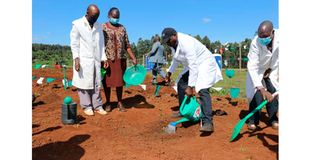Moi University embraces horticulture to attain sustainability

From right: Moi University Vice chancellor Prof Isaac Kosgei, Higher Education PS Simon Nabukwesi, Varsity’s council chairperson Dr Humphery Njuguna and other stakeholders during the launch of apple farming at the institution’s farm.
Moi University is in advanced plans to establish a multi-million model farm as it seeks to expand its revenue streams and cut over-reliance on inadequate government funding.
The university council chair, Dr Humphrey Njuguna disclosed that the university has requested for Sh700 million from the Ministry of Education to finance the growing of apples and other horticultural crops on a 1,000 acre farm. The university will target export markets in Europe.
“We are now in the spotlight from IMF. Moi University is one of the three universities on IMF radar because of financial problems. We have one thousand causal workers whose jobs are at risk. In the next four years, we believe this project has the potential to return the university to its financial stability position and that is why we are appealing to the government to support us financially to implement this project,” he said.
Dr Njuguna said that they would seek support from private investors, as well, to expand the project from the current 100 acres to 1,000 acres and also support the upgrade of hostels in the university.
“From our projections, we will make Sh79 million per acre from apples and from the current 100 acres, we can earn Sh79billion in the next four years. With this money, we will be able to bring down all those old structures and put up Harvard-like structures to transform to one of the best universities in the continent,” he stated.
600 apples trees
From his calculations, one tree can produce 2,000 apples (333kg) in four years with six apples making a kilo. An investment of 600 apples trees per acre and a kilo of apples on the export market going for Sh400, the university projects a revenue of Sh79 million. However, Dr Njuguna did not provide the cost of expenditure.
He observed that when the current council was appointed last year, they inherited a debt of staggering Sh4.5 billion, out of which Sh2.6 billion is owed in unremitted pension. The university is endowed with vast unexploited land, access to permanent water sources (adjacent Kesses dam and river) and skilled labour from the Department of Agriculture and Natural Resources to catapult the ambitious project.
In 2021/2022 Financial year, the National Treasury is set to cut funding to public universities by 9 per cent – Sh9.4 billion – despite an expected increase in enrolment that will further deepen the financial crisis.
Higher Education principal secretary, Simon Nabukwesi, challenged all the institutions of higher learning in the country to devise ways for financial independence.
“We have always encouraged universities to come up with ways to become financially stable by creating other sources of resources so that we (may) reach the standards that universities in the developed world have reached,” said the PS.
Kenyan universities
He noted that through such initiatives, Kenyan universities can raise funds to support scholars in the academies to champion innovations, research or creation of new ideas in the universities.
“I know sometimes our lecturers are not motivated because there is no monetary reward or promotions for what they do. And sometime we don’t talk about it yet there is so much they can offer if they are rewarded,” observed the official.
The vice chancellor, Prof Isaac Kosgey, said that the project will enable university transform its financial position.
“As university management, we are keen and committed to ensure this project realises its potential and every coin is accounted for,” said the VC.
He said that the university hopes to spur the production of the apples as it eyes local and international markets.





